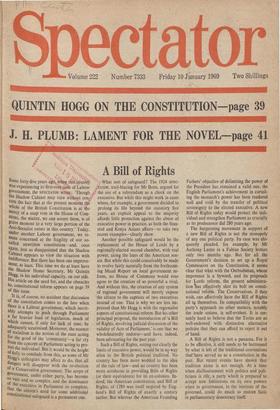A Bill of Rights
cern the fact that at the present moment the Whole of the British Constitution is at the mercy of a snap vote in the House of Com- mons, the matter, we can assure them, is of grave moment to a very large portion of the Anti-Socialist voters in this country.' Today, under another Labour government, we re- main concerned at the fragility of our so- called unwritten constitution—and, once again, just as disappointed that the Shadow Cabinet appears to view the situation with indifference. But there has been one improve- ment, at least. This time we do at least have the Shadow Home Secretary, Mr Quintin Hogg, in his individual capacity, on our side. His article on the need for, and .the obstacles to, constitutional reform appears on page 39 of this issue. was experiencing its first-evk sat of bour 4.1TATOR, trail-blazing for Mr Benn, argued for government, the SPECTATOR wrote : 'Though the use of a referendum as a check on the the Shadow Cabinet may view without con executive. But while this might work in cases where, for example, a government decided to prolong its life beyond the statutory five years, an explicit appeal to the majority affords little protection against the abuse of executive power in practice, as both the Stan- sted and Kenya Asians affairs—to take two recent examples—clearly show.
Another possible safeguard would be the replacement of the House of Lords by a regionally-elected second chamber, with real power, along the lines of the American sen- ate. But while this could conceivably be made to evolve fairly naturally from the forthcom- ing Maud Report on local government re- form, no House of Commons would ever agree to the creation of so powerful a rival. And without this, the creation of any system of regional government will merely expose the citizen to the caprices of two executives instead of one. That is why we are less im- pressed than Mr Hogg is with the regionalist aspects of constitutional reform. But his other principal proposal, the introduction of 'a Bill of Rights, involving judicial discussion of the validity of Acts of Parliament,' is one that we wholeheartedly endorse—and have, indeed, been advocating for the past year.
Such a Bill of Rights, setting out clearly the limits of executive power, would be in n? way alien to the British political tradition. No country has been more wedded to the idea of the rule of law—and no country has been more assiduous in providing Bills of Rights (or their equivalents) for its ex-colonies. In- deed, the American constitution, and Bill of Rights, of 1789 was itself inspired by Eng- land's Bill of Rights of exactly a century earlier. But whereas the American Founding Fathers' objective of delimiting the power of the President has remained a valid one, the English Parliament's achievement in curtail- ing the monarch's power has been rendered null and void by the transfer of political sovereignty to the elected executive. A new Bill of Rights today would protect the indi- vidual and strengthen Parliament as crucially as its predecessor did 280 years ago.


































